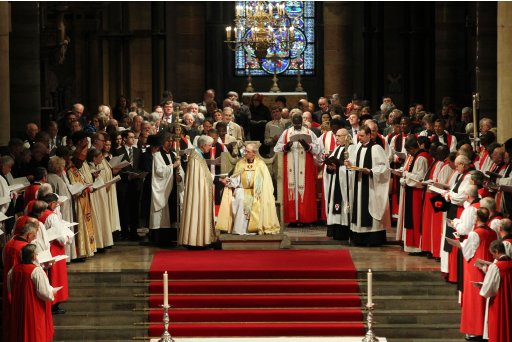
Last Thursday Elizabeth and I had the privilege of attending Archbishop Welby's enthronement service at Canterbury Cathedral. So much has providentially occurred in my relationship with ++ Welby since we first met last May at HTB, that I still find myself "pondering these things in my heart." In that vein, I will offer a few personal reflections about the man, what the enthronement service symbolized for the Church, and finally what I think he and it may portend for North American Anglicanism.
As is widely known, ++Welby has had a long and fruitful service to the Church through the reconciliation ministry of Coventry Cathedral. This ministry is known to Truro mostly through our relationship with Canon Andrew White (aka "Vicar of Baghdad" see http://en.wikipedia.org/wiki/Andrew_White_%28clergyman%29) and Canon J John, one of Anglicanism's foremost evangelists and a close associate with another Truro friend, Leighton Ford. ++Welby has worked closely with Andrew and shares his vision of the Church as a body of "reconciled reconcilers." As ++Welby has articulated numerous times, he sees reconciliation ministry as a process of de-escalating and detoxing conflict so that issues dividing people can be addressed and managed in ways that are no longer destructive to community. It is a measured attempt, among other things, to create a zone of dialogue and friendship which lends itself to human flourishing, even when the "issues" themselves are not fully resolved. It is NOT an attempt to paper over differences nor to make nice. It is not an attempt to "meld" conflicted groups. This ministry of reconciliation, as practiced by Coventry, has an extraordinary track record throughout the world and none more notable than Canon White's ministry in Baghdad. As you know, this is a ministry that many of us at Truro already supported before I became friends with ++Justin Welby. We now wait to see if these same skills and principles can be applied to the Anglican war in North America. I believe they can, but it won't be easy until a cease-fire can be established. And I think 815 bears the onus of responsibility in this regard.
Another aspect of the man that has become more known recently, and was widely evidenced at Canterbury, is his deep indebtedness to Holy Trinity Brompton Church. I will cite some examples of this indebtedness: the Vicar of HTB, Sandy Millar, introduced Justin to Caroline, while they were at Cambridge. It was HTB that comforted Justin and Caroline after the tragic death of their nine month old daughter, Johanna. It was HTB that nurtured their faith through the Alpha course and a home group they co-lead with Paul Perkin, another important player in this unfolding drama. (BTW, Paul is Tim and Ros Mayfield's former boss and mentor at St Mark's Battersea Rise. Tim learned to lead worship at Justin's home group and served Justin as a seminary intern whilst at Ridley Hall, Cambridge). It was HTB where Justin and Caroline discerned a call to vocational ministry and it was HTB that sent them to seminary. It is difficult to overstate the indispensable role of HTB in the formation of our current Archbishop of Canterbury. And I believe HTB will continue to play a significant role in his archiepiscopacy. In terms of the history outlined above, the most memorable moment of the service for me was when I saw Sandy Millar watch ++Justin as he ascended St Augustine's chair. Sandy's look of both affectionate tenderness and spiritual intensity toward ++Justin, was a Moses-Joshua, mentor-mentee moment that I shall never forget. This was THE significant moment that most commentator's missed and its importance should not be lost on us. There were several receptions afterwards, but the one we attended was essentially an HTB re-union.
What does this portend for North American Anglicanism? That is not the most important question that comes to me but it is one that I know concerns many readers of this blog. In a future post, I will address the more important question - which is, what does this portend for world Christianity? But for now, allow me to go out on a limb and prognosticate. First, I think it will mean that within a decade ACNA will be recognized in formal relationship to the C of E and thus, the wider Anglican Communion. I think this will happen as both a means to the kind of reconciliation described in paragraph one - not as a full, final reconciliation in the truth of Christian faith, but as a zone of welcome that detoxes our current conflict and sets us on a path of the truer and deeper reconciliation that come from repentance, amendment of life and renewal in the Holy Spirit (see this recent sermon for some important distinctions missed by the culture warriors on both ends of the ideological spectrum: http://www.truroanglican.com/uploads/I_Am_Life_for_the_Dying.pdf ). Second, I think it will mean that North American Anglicanism, in all its deviant and wounded incarnations, will enter into a season of humiliation and amendment of life. We will cease to call the shots and set the agenda for the rest of the Communion unless and until we can model the kind of peacemaking that is at the heart of the Christian gospel. Right now we have radiated our toxic schism and theological heresies (everything from "gay marriage" to "seven point Calvinism on steroids"- sheesh, talk about taking on the attributes of your oppressors), and that will have to cease . I think the first and second developments will occur in tandem, as the spoilers of peace are contained or relocated to one of the many sects of North America. There is more hope for ACNA in this regard since our theological deviants do not appear to have infected the head.
In a subsequent post, I will address issues of greater import such as world evangelization and greater unity between Anglican and Roman Christianity.




